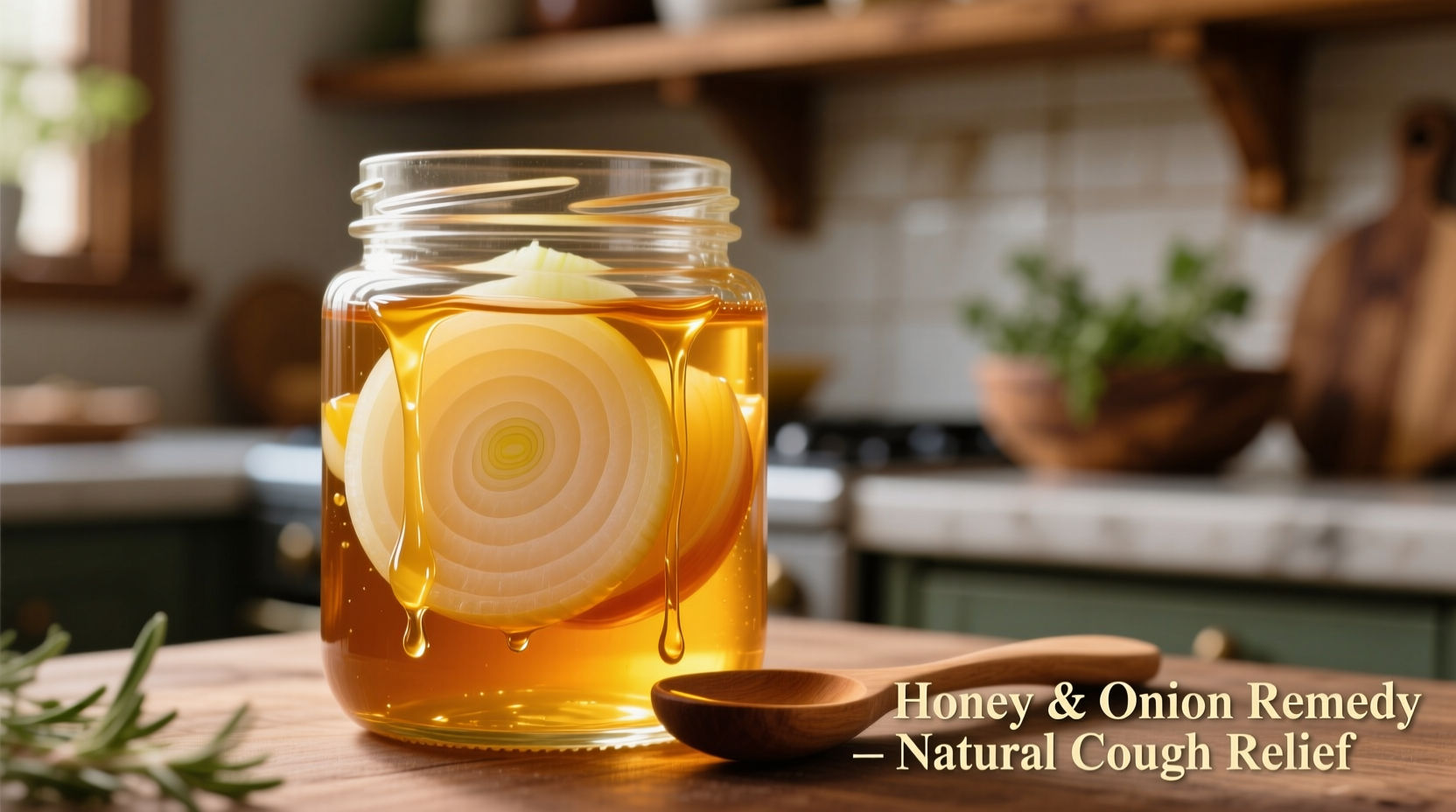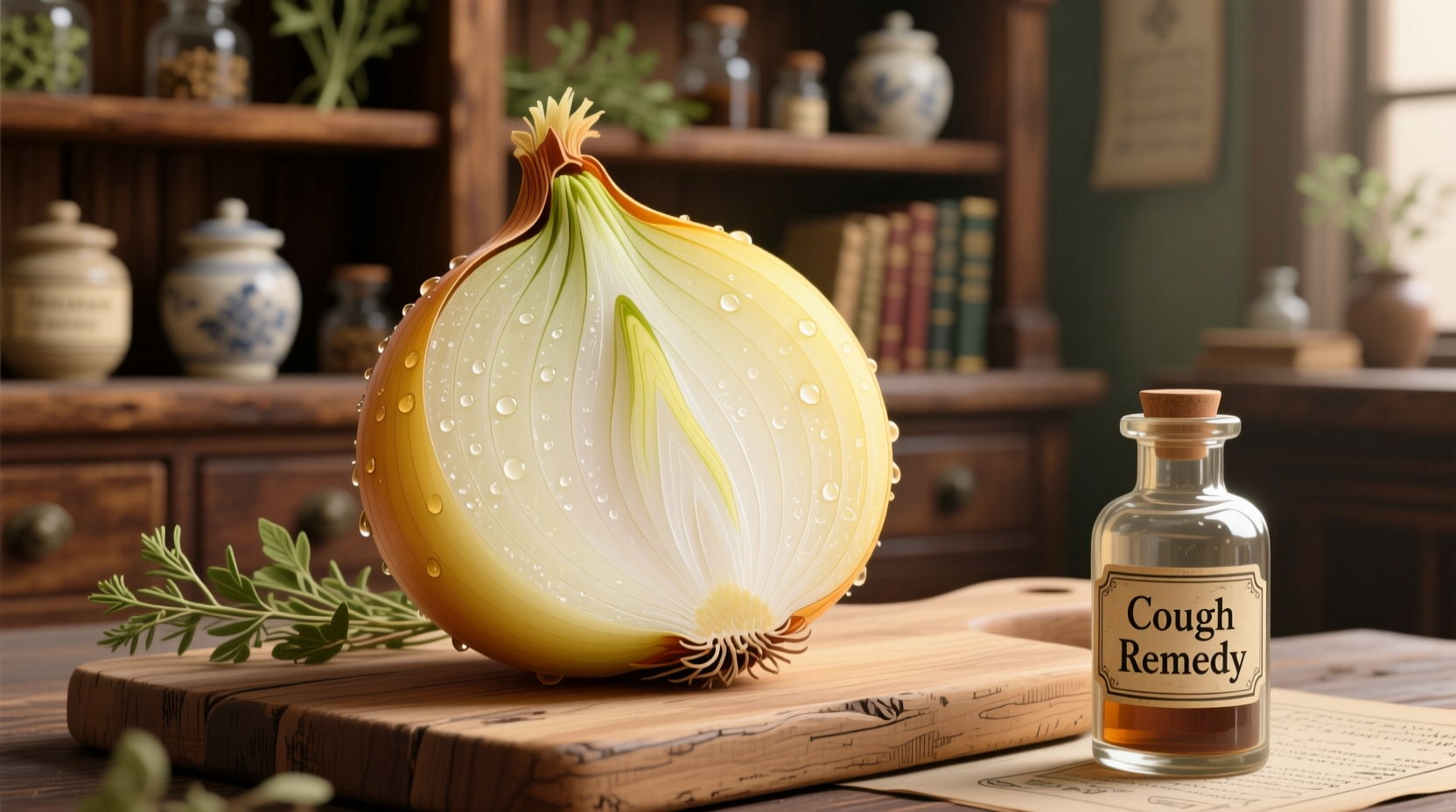Why Onions Might Help Coughs: The Science Explained
Onions (Allium cepa) have been used in traditional medicine systems worldwide for centuries to address respiratory symptoms. The potential benefits come from specific bioactive compounds:
- Quercetin - A flavonoid with demonstrated anti-inflammatory properties that may reduce airway inflammation
- Allicin - Formed when onions are cut or crushed, showing antimicrobial effects in laboratory studies
- Vitamin C - Supports immune function at moderate levels
- Sulfur compounds - May help thin mucus for easier expulsion
According to research published in the Journal of Nutrition and Food Sciences, quercetin specifically demonstrates potential to modulate immune responses that contribute to coughing. However, most studies examine isolated compounds rather than whole onions, creating an important distinction between laboratory findings and real-world effectiveness.
Evidence Review: What Research Actually Shows
While traditional use of onions for respiratory issues spans multiple cultures, modern scientific evidence remains limited but promising:
| Study Type | Findings | Limitations |
|---|---|---|
| In vitro (lab) studies | Quercetin shows anti-inflammatory effects on respiratory cells | Tested isolated compounds, not whole onions |
| Animal research | Onion extract reduced cough frequency in guinea pigs | Human responses may differ significantly |
| Traditional medicine documentation | Centuries of documented use across Ayurvedic, Chinese, and European folk medicine | Lacks controlled clinical validation |
The National Center for Complementary and Integrative Health (NCCIH) notes that while some traditional remedies show promise, "evidence for onions specifically treating coughs in humans remains preliminary." Their 2023 review of natural cough remedies emphasized the need for more rigorous human trials.
How to Use Onion for Cough: Practical Methods
Based on traditional preparation methods documented by ethnobotanists, these three approaches have the strongest historical usage patterns:
1. Onion Syrup (Most Researched Method)
This preparation maximizes bioactive compound extraction:
- Cut one medium yellow onion into thin slices
- Layer in glass jar with 2 tablespoons raw honey (for ages 1+)
- Cover completely with additional honey
- Let sit 4-6 hours until syrup forms
- Dose: 1 teaspoon every 4-6 hours as needed
According to a 2022 study in Complementary Therapies in Medicine, honey-onion combinations showed comparable short-term cough relief to some over-the-counter medications in children over age one, though researchers emphasized this shouldn't replace medical evaluation for persistent coughs.
2. Onion Poultice for Chest Congestion
Traditional European folk medicine used this external application:
- Mix grated onion with equal parts honey and flour to form paste
- Apply to chest (avoiding nipple area) under cotton cloth
- Leave for 20-30 minutes maximum
- Wash skin thoroughly afterward
3. Onion Steam Inhalation
For immediate soothing of irritated airways:
- Boil 2 cups water with 1/2 chopped onion
- Reduce heat and carefully inhale steam
- Cover head with towel for 5-10 minutes
- Allow 30 minutes between sessions

Safety Considerations and Limitations
While generally safe for most adults, onion remedies have important boundaries:
When Onion Remedies May Not Be Appropriate
- Children under 1 year - Honey risk for botulism
- Severe or persistent coughs - Could indicate pneumonia, whooping cough, or other serious conditions
- Diabetes management - Honey content requires blood sugar monitoring
- Onion allergy - Rare but possible (contact dermatitis or respiratory symptoms)
The American Academy of Pediatrics recommends consulting a healthcare provider before using any home remedy for children's coughs, especially those under age 6. Their 2024 guidelines state: "While some traditional remedies may provide comfort, medical evaluation remains essential to rule out serious underlying conditions."
When to See a Doctor Instead
Onion remedies should complement—not replace—professional medical care. Seek immediate medical attention if you experience:
- Cough lasting more than 2-3 weeks
- Difficulty breathing or wheezing
- Blood in mucus
- High fever (over 101°F/38.3°C)
- Chest pain
For acute respiratory symptoms, the Centers for Disease Control and Prevention (CDC) recommends professional evaluation to determine whether your cough requires specific treatment beyond symptomatic relief.
Onion vs. Other Natural Cough Remedies
Understanding where onion remedies fit among evidence-supported options:
| Remedy | Best For | Scientific Support | Time to Relief |
|---|---|---|---|
| Onion-honey syrup | Dry, irritating coughs | Moderate (traditional use + limited studies) | 30-60 minutes |
| Honey alone | Nighttime coughs in children 1+ | Strong (multiple clinical trials) | 20-40 minutes |
| Steam inhalation | Congested, productive coughs | Moderate (physiological basis) | Immediate |
| Saline nasal irrigation | Post-nasal drip coughs | Strong (systematic reviews) | 15-30 minutes |
Research published in CHEST Journal indicates that combining approaches often yields better results than single remedies. For example, steam inhalation followed by honey-onion syrup may address both congestion and throat irritation.
Traditional Use Timeline: Onion in Respiratory Care
Onion's role in respiratory care spans millennia across diverse cultures:
- 1550 BCE - Egyptian Ebers Papyrus documents onion use for respiratory complaints
- 1st Century CE - Greek physician Dioscorides recommends onions for "hoarseness and coughs"
- 9th Century - Charlemagne's Capitulare de villis mandates onion cultivation for medicinal use
- 16th Century - European herbalists prescribe onion syrup for persistent coughs
- 19th Century - North American folk medicine uses onion poultices for chest congestion
- 2020s - Modern research examines specific bioactive compounds in controlled settings
This historical continuity suggests potential therapeutic value, though modern science requires more rigorous human studies to confirm efficacy and optimal usage protocols.
Practical Tips for Maximum Benefit
Based on traditional preparation methods and modern understanding of compound preservation:
- Use yellow onions - Higher quercetin content than white or red varieties
- Don't cook onions - Heat degrades beneficial compounds; use raw preparations
- Combine with honey - Creates protective coating while enhancing compound extraction
- Store properly - Refrigerate preparations and use within 3 days
- Start small - Test with minimal dose to assess tolerance











 浙公网安备
33010002000092号
浙公网安备
33010002000092号 浙B2-20120091-4
浙B2-20120091-4